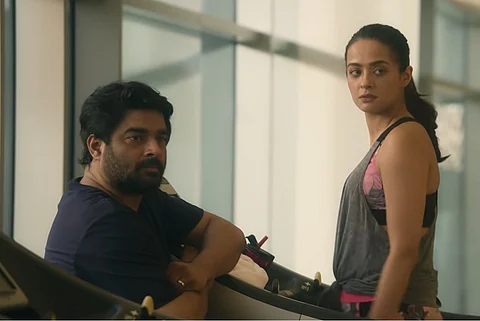

Horror and humour are two genres Indian filmmakers and content creators have found very hard to crack. Not surprisingly our attempts at making a good horror film often end up being inadvertent comedies while our attempts at humour have fairly horrifying results. Decoupled, now streaming on Netflix, is a show that like many Netflix offerings recently sounds great as a one-line concept, but the execution is unforgivably poor.
Decoupled, a series about a wealthy couple deciding to separate and dealing with the ramifications of that decision is an Indian attempt at satire that resorts to David Dhawan-like gags to evoke laughter. Cinema in the ‘80s and ‘90s specialised in humour that was crass, loud, and insensitive. All the supposed jokes were based on body shaming, slut shaming, mocking persons with disabilities, mocking sexual orientation and gender identity, naked men and penis spotting, and of course, belittling women who weren’t the hero’s mother.
For better or for much better, Indian audiences have evolved past such humour and the stupendous failure of films like Coolie no 1 (the remake) prove that anything that looks, or sounds dated just isn’t going to make it anymore. With Decoupled, writer and creator Manu Joseph and Director Hardik Mehta attempt to create what I think was supposed to be a satire on the upper-middle class and its hypocrisy. Sadly, it does not end up being funny because the writing fails its characters and by extension the actors completely.
Arya Iyer (R Madhavan) and Shruti Sharma (Surveen Chawla) live in a plush bungalow in Gurgaon with their daughter Rohini. Rohini’s age I assume was changed to twelve in post-production because the dubbing cannot change Surveen mouthing ten quite obviously. Perhaps this was because the pandemic has delayed shoots and releases by over 18 months, but unfortunately, the makers didn’t use this time to see if their jokes were actually landing.
There are extended gags about how to get an elderly gentleman to use a condom, about how women are more likely to want sex when they are ovulating (mansplained to us by three men), and a shameful sequence where a driver is invited to a fancy art exhibition so that two privileged men can extend their first world squabble.
Arya, as we are repeatedly told, is India’s second most popular novelist who is trying to strike a deal with Netflix, while Shruti has quit her corporate job to start her own company. At one point we are told she is a venture capitalist; at another point, she says she is struggling because she has started her own company so it’s a little difficult to figure out. Either way, they live in a large bungalow, are chauffeured around in a luxury car by a driver whose body odour they criticise in his presence. Yes, that’s right, crass, insensitive, and unapologetic about it.
Decoupled is the kind of show which if discussed at a social gathering would evoke reactions like, “but people do treat domestic workers badly”, “women do talk like that”, “but men do think about sex all the time”, “where is your sense of humour”, and “just lighten up”, and so on. This is the kind of show that will make you question yourself when you take offense when Arya refuses to shake hands with teenage boys because they masturbate frequently, is ashamed of his ex-girlfriend because she has gained weight and gives a woman a gold chain, and then calls it a down-payment for sex. I am all for quirky and eccentric but sadly Manu Joseph writes Arya as a character who speaks in punchlines, provokes those around him, and deliberately says and does things that he knows will get him attention.
Shruti on the other hand is written as being sophisticated, cool, and classy/classist, but her poise and never-a-hair-out-of-place personality end up distancing her from the viewer. If her character was supposed to be a satirical take on upper-middle-class women in Gurgaon, it doesn’t make sense to viewers outside that geography because to us she just seems equally self-obsessed and emotionally unavailable.
Writing unpleasant characters but still making them likeable is an art that very few writers have mastered. If Arya was supposed to be a genius like Sheldon from The Big Bang Theory who offended people regularly, it just doesn’t have the same impact. Perhaps because at his core Sheldon was not an entitled or cruel person. Arya on the other hand is smug, self-absorbed, and constantly trying to lord his supposed intellectual superiority over everyone. At one point in the series, he suddenly acknowledges this, but since the writer never allows us to build an emotional connection with Arya, his words sound shallow and again somehow about himself rather than his wife. The only time I actually managed a wry smile is when Arya’s driver asks him what his caste is and then adds that those who don’t know their caste are definitely upper caste.
Madhavan and Surveen Chawla try very hard to do justice to their parts but often it seems like they aren’t completely convinced by their character’s motivations. The supporting cast is given even worse treatment with every character being reduced to a one-line stereotype. Quite dangerously, a counsellor is portrayed as someone addicted to traumatic stories. At a time when so many people are reaching out to seek help with their mental health, to undermine the process of therapy is unacceptable.
Decoupled tries too hard to be out of the box and funny and ends up being anything but that. Binge at your own risk.
Disclaimer: This review was not paid for or commissioned by anyone associated with the series/film. TNM Editorial is independent of any business relationship the organisation may have with producers or any other members of its cast or crew.